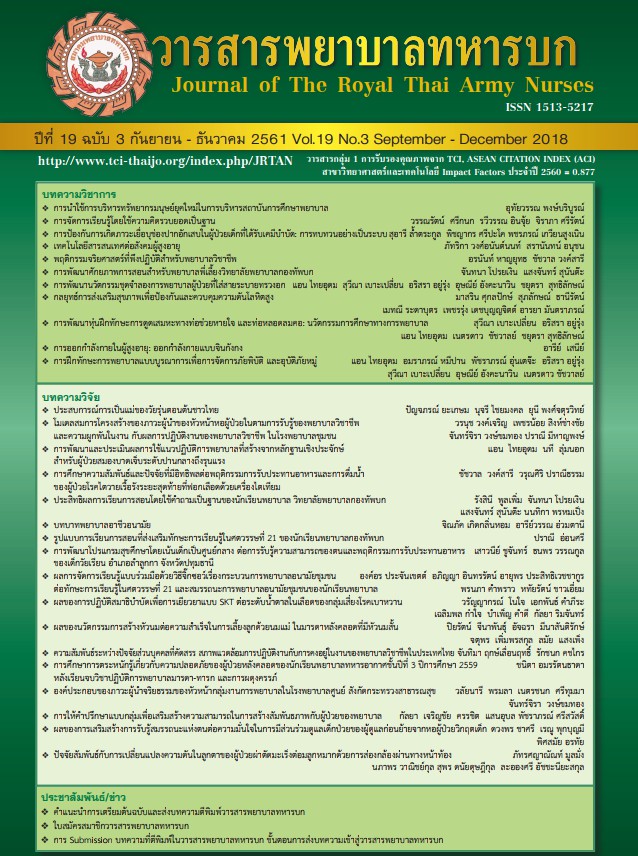Effect of Self-Efficacy Promotion on Caregiver’s Confidence of Participation in Child Care before Discharge from Pediatric Intensive Care Unit
Keywords:
self-efficacy promotion, confidence of Participation in child care, caregivers of sick childAbstract
This quasi-experimental research compares caregiver’s confidence of participation in child care between promoted group and regular care group before discharge from PICU. The sample group were 52 caregivers of sick children before discharge from PICU of Bhumibol Adulyadej Hospital. They were divided into 2 groups of 26 caregivers in each. Control group obtained regular care only, and experimental group obtained promotion program of self-efficacy perception combined with regular care. There were 3 steps: 1) caregiver preparation step 2) teaching, demonstration child care participation, skill training, and experience reviewing through successful practice step, and 3) verbal persuasions step to build confidence and enhance the highest potential. Data were analyzed by using descriptive statistics and ANCOVA. The results revealed that after controlling for pre-test differences in the confidence of caregivers, the post-test mean scores of caregiver’s confidence of participation in child care in the experimental group were statistically significantly higher than those in the control group (p < .05). The result indicated that the program of self-efficacy perception could enhances caregiver’s confidence of participation in child care before discharge from PICU. Therefore, the application of promotion program of self-efficacy perception should be promoted from PICU to ordinary ward on patient transferring plan to enhance caring plan and forwarding patient practice.
References
2. Manning J, Hemingway P, Redsell S. Protocol for a longitudinal qualitative study: survivors of childhood critical illness exploring long-term psychosocial well-being and needs-The SCETCH Project. BMJ open. 2014; 4(1):1-10.
3. Colville G, Darkins J, Hesketh J, Bennett V, Alcock J, Noyes J. The impact on parents of a child’s admission to intensive care: integration of qualitative findings from a cross-sectional study. Intensive and Critical Care Nursing. 2009; 25(2):72-79.
4. Kaitsara S. Factors Predicting Parental Stress and Parental Coping with Children in PICU. Thai Journal of Nursing. 2007; 56(3):46-57. (In Thai)
5. Amphorn R. Parent participation in the care of hospitalized children at community hospital. Nursing Journal. 2006; 33(3):23-33. (In Thai)
6. Khaenapa R. Parent Participation in the Care of Hospitalized Children. Ramathibodi Nursing Journal. 2011; 17(1):232-247. (In Thai)
7. Busse M, Stromgren K, Thorngate L, Thomas K. Parents’ responses to stress in the neonatal intensive care unit. Critical Care Nurse. 2013; 33(4):52-59.
8. Brooke J, Hasan N, Slark J, Sharma P. Efficacy of information interventions in reducing transfer anxiety from a critical care setting to a general ward: a systematic review and meta-analysis. Journal of critical care. 2012; 27(4):425-429.
9. Sopit S. Effects of Self-Efficacy Promotion on Perceived Self-Efficacy of Caregivers Participating in Care Provided to Critically Ill Children. Ramathibodi Nursing Journal. 2011; 17(1): 63-74. (In Thai)
10. Amarawadi B. Needs and Met Needs of Parents of Children Transferred from Pediatric Intensive Care Units. Journal of Nursing Science. 2013; 31(2):60-70. (In Thai)
11. Supattra K. Effects of Family-Centered Care on Self-Efficacy in Participatory Involvement in Child Care and Satisfaction of Mothers in PICU. Thai Journal of Nursing Council. 2007; 11(3):203-213. (In Thai)
12. Pattaranuch P. Factors influencing parents uncertainty in illness of chronically ill children with intubation. Journal of Nursing Science. 2012; 30(3):15-16. (In Thai)
13. Bandura A. Self-efficacy: The Exercise of Control. New York: W.H. Freeman and Company; 1997. (In Thai)
14. Soranee A. Effects of using nursing service program emphasizing family participation on re-admission of children with pneumonia, caring behavior of family caregivers, and satisfaction with nursing service. Journal of Nursing Science Chulalongkorn University. 2008; 20(1):81-95. (In Thai)
15. Alongkorn A. The Effects of Concrete-objective Information on Parental Anxiety and Parental Participation in Care for Children in Pediatric Intensive Care Unit. Journal of Nursing Science. 2010; 30(2):80-89. (In Thai)
16. Tassanee P. Self-efficacy and Health Behavior. The Thai Journal of Nursing Council. 2011; 16(3):1-10. (In Thai)
17. Peterson AM, Harper FW, Albrecht TL, Taub JW, Orom H, Phipps S, et al. Parent caregiver self-efficacy and child reactions to pediatric cancer treatment procedures. Journal of Pediatric Oncology Nursing, 2014; 31(1):18-27.
18. Ratanarat T. Effects of the Perceived Self-Efficacy Promotion Program on Maternal Confidence to Perform Nasal Irrigation for Children with Retained Nasal Secretion. The Journal of Facalty of Nursing Burapha University. 2013; 22(2):28-38. (In Thai)
19. Yodrawee K. The effect of perceived self-efficacy promoting program on maternal caring behavior to prevent recurrent pneumonia in toddler (Dissertation). Bangkok, Chulalongkorn University; 2010. (In Thai)
Downloads
Published
How to Cite
Issue
Section
License
บทความหรือข้อคิดเห็นใดใดที่ปรากฏในวารสารพยาบาลทหารบกเป็นวรรณกรรมของผู้เขียน ซึ่งบรรณาธิการหรือสมาคมพยาบาลทหารบก ไม่จำเป็นต้องเห็นด้วย
บทความที่ได้รับการตีพิมพ์เป็นลิขสิทธิ์ของวารสารพยาบาลทหารบก
The ideas and opinions expressed in the Journal of The Royal Thai Army Nurses are those of the authors and not necessarily those
of the editor or Royal Thai Army Nurses Association.





